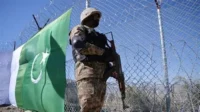Pakistan’s huge deportation drive has forcibly repatriated scores of Afghans awaiting resettlement in the United States, an advocacy group and Afghan applicants say, adding that Pakistani authorities often ignored U.S. embassy letters of protection.
That complicates the efforts of such Afghans, as the U.S. has shuttered its embassy in Kabul and they must also grapple with human rights restrictions and stubborn financial and humanitarian crises in their homeland.
Islamabad began expelling more than a million undocumented foreigners, mostly Afghans, on Nov. 1, amid a row over accusations that Kabul harbours Pakistani militants, a charge the ruling Taliban deny.
More than 450,000 Afghans have returned home, the United Nations says, many now living in difficult winter conditions near the border.
At least 130 Afghans being processed for U.S. special immigration visas or refugee resettlement in the United States have been deported, said Shawn VanDiver, president of #AfghanEvac, the main coalition of groups helping such efforts.
He cited data from coalition members and details provided to the U.S. government by its Islamabad embassy, which he has seen.
Pakistani police have arrested more than 230 such Afghans, although about 80 have since been released, he added.
Speaking on condition of anonymity, a senior State Department official said the United States had “no formal way to track these kinds of cases”, adding that the number of Afghans deported while awaiting U.S. resettlement was “very small”.
Pakistan’s foreign and interior ministries did not respond to requests for comment.
As the clock ticked down to Nov. 1, the embassy e-mailed protection letters to some 25,000 Afghans to prove to Pakistani authorities they were being processed for resettlement in the United States, after its last troops left Kabul in 2021.
A U.S. State Department spokesperson said Washington had also supplied Pakistan with a list of Afghans “in the U.S. resettlement pipelines” after it unveiled the deportation plan in October.
VanDiver and two Western diplomatic sources, who requested anonymity to discuss the issue, said local authorities had ignored the letters in many instances.
“The letters matter in some cases and not in others,” said VanDiver. “Not all local officers are abiding by it.”
The senior State Department official said the United States has examples of Pakistani police respecting the letters, but gave no details.
Reuters spoke with two Afghan families whose members were deported after showing police the letter, and an Afghan who was detained despite the letter.
The latter said he was released with a warning that he would be arrested again without a visa extension.
Refugee advocates and Afghans say the deportations and arrests underscore the precarious nature of the long wait facing Afghans whom Washington has vowed to protect and resettle, many of them told to travel to a third country for processing.






